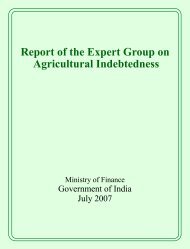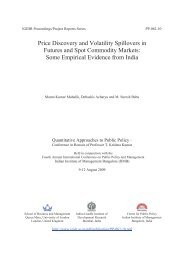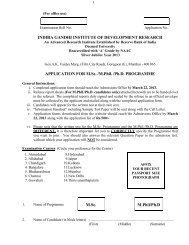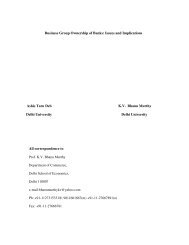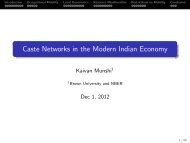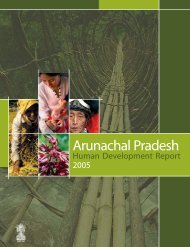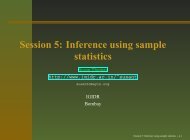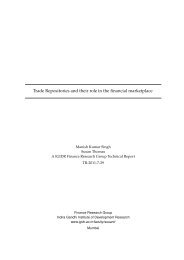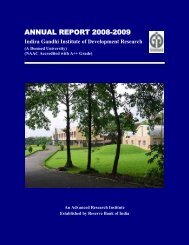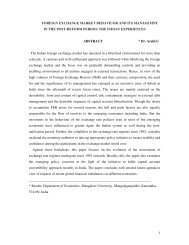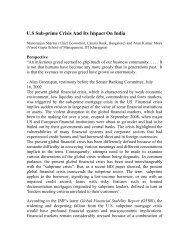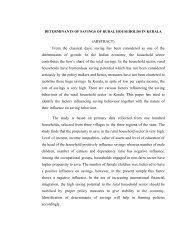Kerala 2005 - of Planning Commission
Kerala 2005 - of Planning Commission
Kerala 2005 - of Planning Commission
You also want an ePaper? Increase the reach of your titles
YUMPU automatically turns print PDFs into web optimized ePapers that Google loves.
18<br />
was also a compelling internal dynamics that contributed<br />
to the political acceptability and commitment to the task<br />
<strong>of</strong> decentralisation. In Section 3.1, we noted that up<br />
to the late 1980s, there was a situation <strong>of</strong> economic<br />
‘crisis’ in <strong>Kerala</strong>’s development process due to the<br />
poor performance in the commodity producing sectors.<br />
Over the greater part <strong>of</strong> the 1990s, however, with a<br />
‘turnaround’ in economic growth, the prevailing mood<br />
among analysts and observers <strong>of</strong> <strong>Kerala</strong>’s development<br />
was somewhat mixed, if not <strong>of</strong> ‘despondency and<br />
despair’ 22 though the problem <strong>of</strong> unemployment, in<br />
particular educated unemployment, continued to loom<br />
large. The focus <strong>of</strong> discussion in the International<br />
Congress on <strong>Kerala</strong> Studies held in 1994, for instance,<br />
turned out to be on “the contemporary crisis and the<br />
possible solutions rather than on the much acclaimed<br />
achievements <strong>of</strong> the past.” 23 The expectation was that<br />
the spectacular achievements in social development<br />
would, and should, lead to much higher levels <strong>of</strong><br />
economic development and greater inclusiveness than<br />
that achieved so far.<br />
Decentralisation, implying governance closer to the<br />
people and hence more responsive, was seen, if not<br />
as a panacea for all ills, as a way out <strong>of</strong> this logjam.<br />
It was expected to facilitate local-level development<br />
by mobilising both people and resources to strengthen<br />
the productive base, especially in the primary sector by<br />
creating and maintaining public and collective goods,<br />
such as in land and water management and agricultural<br />
extension. In fact, the urge for decentralisation went<br />
beyond this. The aim was the establishment and<br />
institutionalisation <strong>of</strong> local self-Governments and<br />
<strong>Kerala</strong>'s attempt at a participatory, systematic and<br />
transparent process <strong>of</strong> decentralised planning has been<br />
hailed as another <strong>of</strong> its unique achievements (discussed<br />
in greater detail in Chapter 9).<br />
4. Concluding Observations<br />
This chapter has attempted a synoptic review <strong>of</strong><br />
<strong>Kerala</strong>’s development experience, specifically the<br />
historical underpinnings <strong>of</strong> its human development<br />
achievements, in which the role <strong>of</strong> public action both<br />
for the people by the State and by the public for itself<br />
played an important role in furthering its achievements.<br />
The phase <strong>of</strong> ‘human development lopsidedness’<br />
in the State continued for over a decade, causing<br />
considerable concern and generated a wide debate on<br />
the sustainability <strong>of</strong> the <strong>Kerala</strong> ‘model’ <strong>of</strong> development.<br />
A quantum increase in emigration since the latter half<br />
<strong>of</strong> 1970s, especially to the Gulf countries, muted the<br />
intensity <strong>of</strong> the economic ‘crisis’. However, the fact<br />
that the economy did not spiral downwards in terms<br />
<strong>of</strong> human development indicators but experienced<br />
a ‘turnaround’ in economic growth in the late 1980s<br />
in all sectors, but more specifically the service sector,<br />
injected a fresh look at the development experience.<br />
It encouraged us to hypothesise about the possibility <strong>of</strong><br />
an emerging ‘virtuous’ cycle <strong>of</strong> growth in which early<br />
achievements in human development, people seeking<br />
work in labour markets outside <strong>Kerala</strong>, and remittancedriven<br />
growth in consumer demand resulting in<br />
service sector growth, appeared to be closely linked.<br />
The persistence <strong>of</strong> unemployment, in particular<br />
educated unemployment, is perhaps the most serious<br />
form <strong>of</strong> capability failure and is much more ‘open’ in the<br />
specific context <strong>of</strong> a literate/educated <strong>Kerala</strong>. That the<br />
revival process too, expected to equip the unemployed<br />
to seize employment opportunities anywhere, should be<br />
participatory in nature was resolved by the converging<br />
<strong>of</strong> intensive rethinking on questions <strong>of</strong> governance<br />
which would yield better development outcomes. The<br />
expectations from decentralisation, which would bring<br />
the Government closer to the people and hence be more<br />
responsive, transparent and delivery-oriented, were<br />
very high. The Constitutional Amendments in 1993<br />
facilitated the shift towards decentralised governance<br />
and <strong>Kerala</strong> is one <strong>of</strong> the few States that embarked on<br />
this process seriously. Subsequent chapters take up<br />
each <strong>of</strong> these issues in more depth.<br />
22 For example, Tharamangalam (1998).<br />
23 Isaac and Tharakan (1995).



